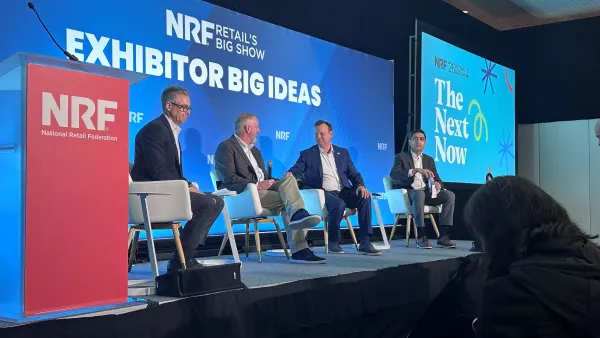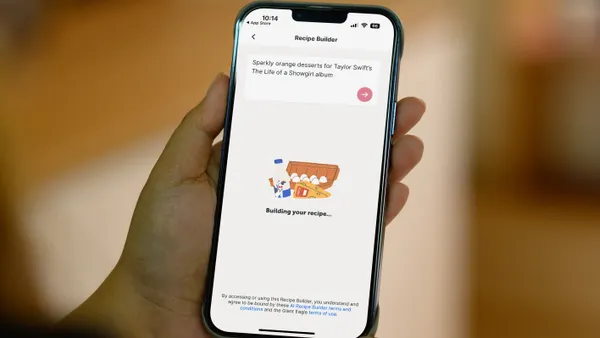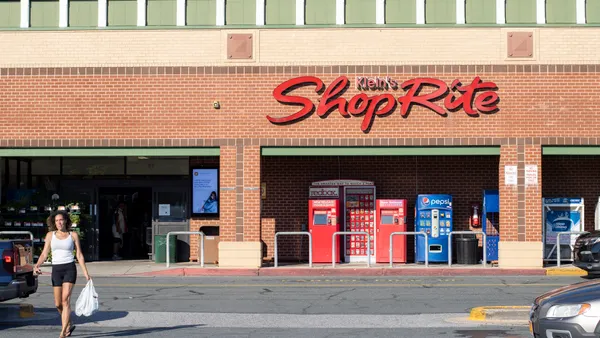Dive Brief:
- Walmart will work with yet another autonomous vehicle company in its quest to dominate grocery delivery, the company announced this week. The new pilot with Udelv, an electric and driverless car company designed specifically for deliveries, will bring groceries to customers in Surprise, Arizona, northwest of Phoenix.
- Udelv will join Ford and Alphabet's Waymo in Walmart's growing fleet of autonomous delivery testing grounds. "What's really cool is that Udelv will utilize a cargo van custom-made to deliver fresh groceries — hand-picked by our personal shoppers — to customers," said senior VP of digital operations Tom Ward in the company post.
- Currently available in about 100 cities reaching 40% of U.S. households, the retailer aims to expand online delivery to 800 additional stores this year, CNBC reported. Customers can now order groceries for curbside pickup at more than 2,100 U.S. stores with a 2020 goal of 3,000.
Dive Insight:
Preparing for the day when customers expect rapid delivery no matter where they are or when they order, Walmart continues to invest in technology to satiate this evolving marketplace. One store in Chandler, Arizona, southeast of Phoenix, has been zipping groceries around in Waymo cars since last July. In November, Walmart teamed with Ford to test its driverless cars for grocery delivery in Miami, where the car company already has a partnership with third-party delivery pros Postmates.
The Ford deal shed light on why, perhaps, Walmart has sought several partners in the autonomous car race. In a press post at the time, Ward emphasized the importance of gathering data on best practices. "Before self-driving cars can go mainstream, we must get a better sense of how people want to interact with them," he said.
With Ford, having tech-forward, delivery-centric Postmates on board seems to be the major selling point. With Waymo and its 8-million-mile, 25-city track record, it seems to be safety and trustworthiness. For Udelv comes the third part of that puzzle: last-mile delivery. The autonomous vehicle company wasn't built with passengers in mind, unlike most such cars in beta-mode today. Udelv cars can be customized to its clients' needs, whether for groceries or pizza or whatever else. Compartments connect to a mobile app, though customers verify their order and open the cargo to retrieve their product, according to the company's website.
While adapting to any new technology takes time, consumers have been leery of grocery delivery, particularly with fresh goods. Walmart has tried to combat that hesitation by employing what it calls "personal shoppers," trained employees dedicated to picking, packing and, in the case of curbside pickup, delivering grocery orders to customers.
Though pickup is free, Walmart charges a $9.95 fee for delivery and requires a $30 minimum purchase with no annual membership costs. Target charges a $99 annual fee ($49 for the first year), but offers free delivery with a $35 minimum purchase, per CNBC. Amazon Prime members can pay $180 a year for free Amazon Fresh deliveries of at least $50. Third-party grocery delivery companies also tack on fees, such as Instacart's $5.99 for two-hour delivery or $149 annual fee with free delivery on orders of $35 or more.
By investing in multiple autonomous car companies, Walmart might be betting on a surefire way to drive down those costs and make the model profitable — especially as consumers inevitably become more comfortable with a stranger picking their produce and meat from the cooler. Brick Meets Click estimates that online grocery purchases will jump 15% this year to snag a 6% share of overall sales. Those numbers could reach as high as 30% for grocers offering delivery and pickup.
Udelv isn't solely experimenting with Walmart, either. The startup also announced a partnership with online grocer Farmstead, which began in September, and prior to that Udelv worked with Buy For Less markets in Oklahoma. In addition, the company announced a project with Chinese search giant Baidu's autonomous driving platform, according to The Verge and will also unleash 100 cars known as The Newton for road tests across the country, TechCrunch reported, noting the deal as "small for now" with the potential to be a turning point.













